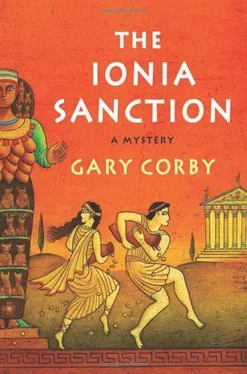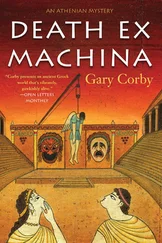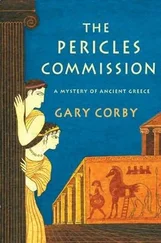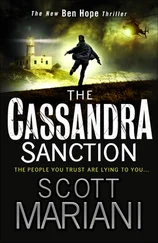Gary Corby - The Ionia Sanction
Здесь есть возможность читать онлайн «Gary Corby - The Ionia Sanction» весь текст электронной книги совершенно бесплатно (целиком полную версию без сокращений). В некоторых случаях можно слушать аудио, скачать через торрент в формате fb2 и присутствует краткое содержание. Год выпуска: 2011, ISBN: 2011, Издательство: Macmillan, Жанр: Исторический детектив, на английском языке. Описание произведения, (предисловие) а так же отзывы посетителей доступны на портале библиотеки ЛибКат.
- Название:The Ionia Sanction
- Автор:
- Издательство:Macmillan
- Жанр:
- Год:2011
- ISBN:9780312599010
- Рейтинг книги:4 / 5. Голосов: 1
-
Избранное:Добавить в избранное
- Отзывы:
-
Ваша оценка:
- 80
- 1
- 2
- 3
- 4
- 5
The Ionia Sanction: краткое содержание, описание и аннотация
Предлагаем к чтению аннотацию, описание, краткое содержание или предисловие (зависит от того, что написал сам автор книги «The Ionia Sanction»). Если вы не нашли необходимую информацию о книге — напишите в комментариях, мы постараемся отыскать её.
The Ionia Sanction — читать онлайн бесплатно полную книгу (весь текст) целиком
Ниже представлен текст книги, разбитый по страницам. Система сохранения места последней прочитанной страницы, позволяет с удобством читать онлайн бесплатно книгу «The Ionia Sanction», без необходимости каждый раз заново искать на чём Вы остановились. Поставьте закладку, и сможете в любой момент перейти на страницу, на которой закончили чтение.
Интервал:
Закладка:
She turned and looked puzzled.
“Our bags,” I prodded.
Asia drew herself up to her full, unremarkable height. “Have you forgotten I am-”
“A slave.”
I thought she was about to argue, but she controlled herself and said, “Yes, master.”
Asia picked up our bags and I followed her into the famed city of Ephesus.
The road from the docks led straight inland. We came at once upon a gymnasium and baths to our left, situated so close to the port that the air was still wet with sea spray. The road turned right and on the outer bend was an amphitheater that dwarfed the one at Athens. Did the Ephesians really have so many people?
On the right was what looked and sounded like an agora. Well-dressed men stood about, gesticulating, shouting, arguing, conferring, reading scrolls, writing notes, and paying each other money. It all looked highly confused to me, and there wasn’t a single stall to be seen.
I asked Asia, “What is that place?”
She looked at it with a confused expression and said, “Master, I don’t know.”
I stopped a passing citizen, who told me we stood at the commercial agora, where men traded entire shiploads or warehouses of goods. I’d never heard of such a thing; Athens had nothing like it.
We passed through some ornamental gates onto a smooth road. I took ten steps before I realized I walked on marble. People pushed past me as if it was perfectly normal to be treading on the most expensive road in the world. The marble road twisted left, and we walked uphill to the second agora, much more reminiscent of the one I’d left behind at home.
The agora of Ephesus was long and thin. The road we’d walked from the docks entered at the west end, and exited on the east. I found it odd pushing my way through the streams of people without being able to look up at the Acropolis. The stallholders were Hellene. They sold vegetables, olives, and olive oil in stacked amphorae; fish and eels and squid. Pottery and bronze ware had its own section, as had something you don’t see much of in Athens: apples. There were entire stalls of apples. They were a delicacy back home, where most people preferred quince. I picked up an apple and inspected it, a mottled yellow, then bit in. The sweet juice trickled down my throat. You could give me apple over quince any day. I pulled out a coin and was about to toss it to the stall owner when I realized there was a problem, a problem I’d never experienced before.
I had the wrong money.
“I’m sorry, I only have Athenian coins,” I said to the stallholder.
“No problem,” he replied. “I’ll take your owls.” All Athenian coins are stamped with the sacred bird of Athena.
“How much?”
“Seven obols.”
I almost dropped the apple in shock. “You could feed a family for a day for that much!”
“Hey mate, you bit into it!”
The error was mine; I should have changed my coins the moment I arrived. The stallholder charged a premium for accepting foreign currency; any shopkeeper in Athens would do the same. I had laughed at the rubes who tried to use their own coins in the agora at Athens often enough. Now it was my turn.
I grimaced and tossed seven coins to the man. He caught them all and I turned away, biting into the most expensive apple I would ever eat.
I almost walked straight into two men, coming the other way. All three of us stopped in time, face-to-face, practically nose-to-nose.
They wore shirts, and trousers, and carried a shield on their backs and a spear in their right hands. Their beards were barbered and curled into ringlets, their skin dark beneath the weathering, their noses large and bulbous. For the first time in my life, I faced Persian soldiers. Throughout my ephebe training, over and over the instinct had been drilled into us: see Persian, kill Persian. My hand went to where my sword would be if I’d still been a soldier in the army. Luckily for me, it wasn’t there.
The one on the right said, “Excuse me,” in the language of the Medes. I understood because Asia had continued to teach me the rudiments of the language as we traveled. The Persian stepped around me. The other did the same on the other side.
I nodded, not trusting myself to speak, but they were already gone.
I’d known, intellectually, that I’d passed from the free city-states of Hellas into the rigidly ruled superstate of the Great King’s empire, but the transition had been so smooth that until that moment I hadn’t noticed. The Persians ruled all the land from the ground on which I stood, all the way to the east. For all I knew, their empire extended to the ends of the earth. The Hellenes controlled every island in the Aegean Sea. When I stepped off Salaminia onto dry land, I had stepped into the empire of our enemy.
The two soldiers stopped at the stalls of the vegetable growers. They chatted with the vendors, who from their looks and dress were Hellene. But they all spoke Persian together. A stall owner said something I couldn’t understand, and they all laughed.
I backed away, and almost tripped over a funeral stele poking up out of the ground. It was so bizarre I stood staring. Everyone else walked around it as if it were perfectly normal to bury your dead in the middle of the market. The memorial stone had one word on it: HERACLITUS.
I shook my head. I’d come to a strange place.
We walked into the side streets and chose an inn that seemed clean. In Athens, it’s the inns closest to the agora that are the best and most expensive. I paid for a private room, which was even more expensive. The innkeeper looked at Asia and smirked, displaying broken, black teeth. The room was on the second floor at the back, small but with sound walls and a decent bed in one corner. I sent Asia down to collect straw for her bedding. She returned with the innkeeper.
“What ye want straw for?” he asked. “Ye’ve got a bed.” He pointed at it, as if I might not recognize the item.
I told him, “That’s for me. The girl needs something to lie on.”
He leered. “That’s you, ain’t it? No need to pretend with me.”
I sent him on his way with firm instructions to send a slave with straw.
“Now we can see the city,” I said to Asia. I was eager to go out and be a tourist.
Asia led me farther along the road we’d walked before. Our path took us out by an eastern gate. Asia said, in an offhand way, “This is the road to Magnesia. If you continue on this way you’ll come to the city in two days.”
I climbed a hill to view Ephesus from the landward side. The city was shaped like a centipede bent in the middle. The wide, curving road Asia had led me up when we arrived was the body, all the buildings to each side and a surprisingly small number of side streets made the legs. There was no high defensive ground of any sort, no acropolis. There was a wall about the city, a bit like a semicircular bubble poking inland, but I doubted it would provide any serious resistance to any passing army.
We followed a well-worn path outside the city walls, for perhaps nine or ten stadia, a bit short of a thousand paces, until we came to a large temple, the largest I had ever seen.
“The Temple of Artemis,” Asia announced. “Your girlfriend is probably here.”
“She’s not my-” I broke off.
I looked at the temple nervously. It was huge. People were walking in and out all the time. Asia was probably right, Diotima would be in there somewhere. She might walk down those steps at any moment. I glanced down to see Asia staring up at me with big, round eyes, fourteen and pretty.
“Socrates says you only came to Ephesus to see her.”
“I think I’ll avoid-that is, I’ll surprise Diotima later, not now.”
Asia shrugged. She turned and led me back into the city.
Читать дальшеИнтервал:
Закладка:
Похожие книги на «The Ionia Sanction»
Представляем Вашему вниманию похожие книги на «The Ionia Sanction» списком для выбора. Мы отобрали схожую по названию и смыслу литературу в надежде предоставить читателям больше вариантов отыскать новые, интересные, ещё непрочитанные произведения.
Обсуждение, отзывы о книге «The Ionia Sanction» и просто собственные мнения читателей. Оставьте ваши комментарии, напишите, что Вы думаете о произведении, его смысле или главных героях. Укажите что конкретно понравилось, а что нет, и почему Вы так считаете.












